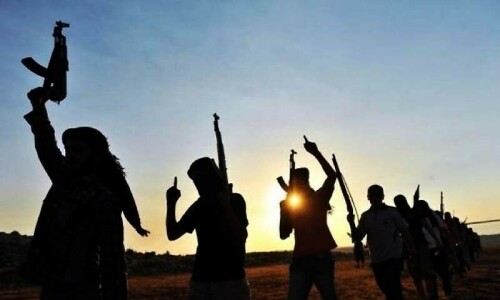WASHINGTON: Army Chief Gen Raheel Sharif will clearly highlight Pakistan’s perspective on new emerging realities in South Asia, a senior member of his delegation said on Sunday.
Director General Inter Services Public Relations Lt Gen Asim Bajwa said that before launching the Fata operation, Pakistan had warned the Afghan government that militants could escape to Afghanistan and they should seal the border and catch them.
“Things that could be done were not, which allowed the terrorists to escape. But instead of focusing on the past, we should focus on how to make the campaign against terrorists more effective,” he said.
Mr Bajwa underlined two levels of engagement between Pakistan and the United States during this five-day visit: “bilateral, military to military relations and regional security and stability”.
“This visit comes at a time when our region is going through a change. The situation is changing fast,” he told a news briefing in Washington.
“Although it is a wide-ranging agenda -- including regional security and stability and bilateral military to military relationship -- all these issues are impacted by emerging regional realities,” he said.
Mr Bajwa said earlier that the army chief had also discussed issues of regional stability with Gen Fan Changlong, Vice Chairman of China’s Central Military Commission, in Rawalpindi last week.
The ISPR chief said that operation Zarb-i-Azb had had a positive impact on the security situation both in Afghanistan and Pakistan. “The law and order has improved greatly and we want to carry it forward,” he said.
Asked if Pakistan would also discuss its concerns about India with the Americans, Mr Bajwa said: “Regional stability includes the situation on the eastern border as well. Unless situation on the eastern border is settled, there will be no stability in the region,” he said. “Pakistan will support any move to improve security in the region.”
Asked to comment on reports in the US media that Washington would also raise Pakistan’s nuclear programme in these talks, Mr Bajwa said: “Pakistan’s nuclear programme is a reality. Let’s keep it in that context and move forward.”
He said that after spending five days in Washington, the army chief would go to Brazil on a three-day visit for talks on cooperation between the two militaries. From Brazil, he will go to Ivory Coast to spend a day with Pakistani troops who were serving there as part of the UN peace keeping force.
“The visit to Washington was planned in July and was part of a military leadership exchange programme. The invitation for this visit came from the US military leadership,” he said.
Mr Bajwa said that at the Pentagon, General Sharif would meet the Secretary of Defence, the US army chief, the Centcom chief and other senior officials.
On the political side, he will meet Secretary of State John Kerry and will also visit Capitol Hill to meet key congressional leaders.
Published in Dawn, November 16th, 2015















































Dear visitor, the comments section is undergoing an overhaul and will return soon.